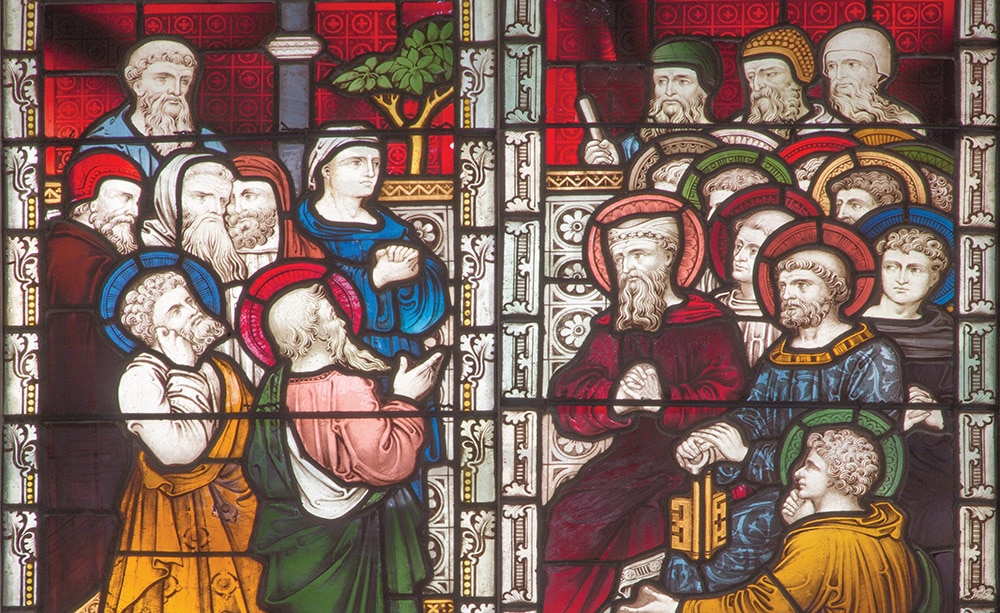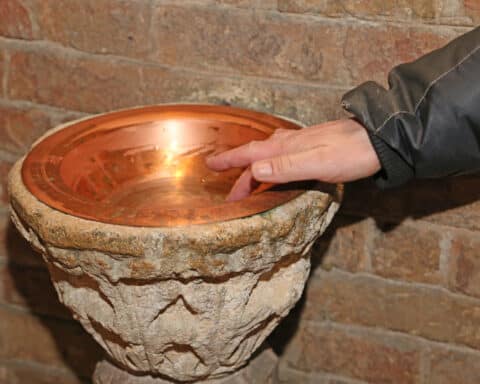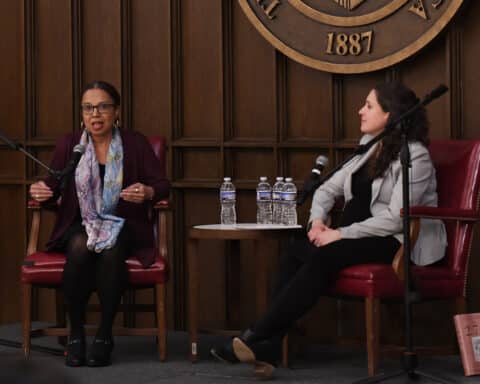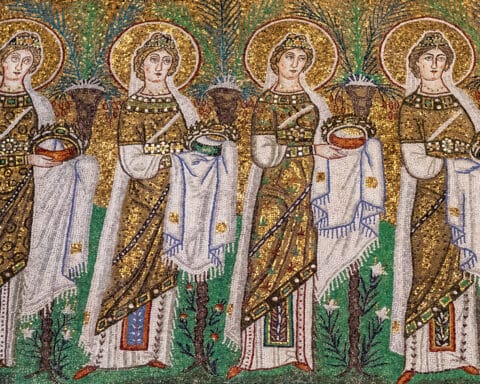One of the great controversies in Church history occurred less than 25 years after Jesus ascended back to his Father. The dilemma concerned whether or not a non-Jew, a gentile, seeking to become a Christian, had to comply with Mosaic law. Initially, all the followers of Christ were Jews, they were born Jews, and thus from birth they complied with the laws of Moses, including circumcision. The question that confronted the early Church was, did a non-Jew Christian have to adhere to the practices of Judaism? Did a gentile have to become a Jew before he could become a Christian? Most of the Jews who had converted to Christianity still practiced all the laws of Moses and were of the mind that the non-Jew converts should do the same. Eventually the issue would be resolved at the Council of Jerusalem around the year A.D. 50.
Pope Benedict XVI discussed this issue in his general audience on Oct. 1, 2008: “It was a matter of settling the question of whether or not circumcision was compulsory for the gentiles who were adhering to Jesus Christ, the Lord, or whether it was lawful for them not to be bound by Mosaic law, that is, the observance of the norms required in order to be upright, law-abiding people, and especially, not to be bound by those norms that concerned religious purification, clean and unclean foods and the Sabbath.”
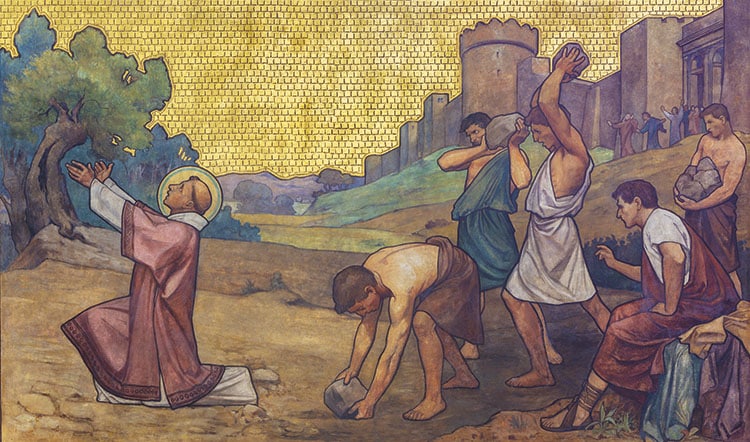
Persecution of Christians — First century
Following the murder of Christ, anyone who professed to follow his teachings was potentially subject to persecutions by either Romans or Jews. In the mid-first century, these were not organized persecutions but mostly at the local level. For the most part, the Romans tolerated Christians. Only if the Christians upset the status quo, caused quarrels with other non-Christian Jews or openly rejected the pagan beliefs of the Romans were the Christians harassed or worse. Reactions by the Romans at that time did not rise to the level of the persecutions imposed on Christians that began later in the century.
It was the traditional Jews who initially took the most offense toward the first Christians. They didn’t believe that the Messiah had come in the person of Jesus and considered the Christians to be troublemakers, spreading teachings that undermined Jewish beliefs. By the early 40s, there is evidence that the Jews used capital punishment, likely with the Roman’s approval, against Christians in Judea. The Jerusalem Sanhedrin stoned to death Stephen, “a man filled with faith and the holy Spirit” (Acts 6:5). Also, King Herod Agrippa I (r. A.D. 41-44) murdered the apostle James the Greater and orchestrated the failed execution of Peter (Acts 12:1-19). As a result, many Christians, or a gentile seeking to become a Christian, could be subject to persecution. This threat increased following the death of Stephen and many people left Jerusalem for other cities and countries. In those locations they told the people about Jesus Christ.
Following Pentecost, when the apostles began to spread the Good News of Jesus, the first converts to Christianity were primarily Jews living in Jerusalem and the surrounding area. It was Peter who took on the role of preaching to these Jews, and there was an immediate split among the people, because many had no interest in Jesus, the one who had been condemned by the Jews and executed by the Romans. The apostles, led by Peter, were harassed, jailed and flogged by the Jerusalem Sanhedrin and charged not to speak about Jesus. These actions only emboldened the apostles who were, “rejoicing that they were counted worthy to suffer dishonor for the name [of Jesus]” (Acts 5:41). The apostles continued to preach both in and outside Jerusalem.
Peter evangelizes beyond Jerusalem
Peter went to the towns of Lydda and Joppa only a short distance from Jerusalem where he evangelized and performed miracles among the Jews living there “and many came to believe in the Lord” (Acts 9:42). Most all Bible readers know that Peter is considered the apostle to the Jews and St. Paul the apostle to the gentiles, but it was Peter who converted the first gentile to Christianity.
Peter was on his way to Caesarea, just north of Joppa, when he stopped to pray and had a vision in which an angel told him to eat foods that Peter and all Jews believed to be unclean. Initially Peter doubted the message, but the angel told him twice more: “What God has made clean; you are not to call profane” (Acts 10:15). While Peter was trying to understand the meaning of the vision, another angel visit was taking place in the house of a Roman soldier, a centurion, stationed in Caesarea. The centurion was Cornelius, a God-fearing man who constantly prayed to the Jewish God. During his vision, Cornelius was told that God had found favor with him and that he should summon Peter to his home.
| Jesus’ Instructions to the Apostles |
|---|
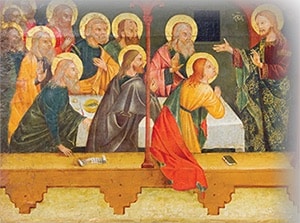 Jesus initially instructed his apostles and disciples to evangelize only to the Jews. “Do not go into pagan [gentile] territory or enter a Samaritan town. Go rather to the lost sheep of Israel” (Mt 10:5-6). In the Gospel according to Luke, “After this the Lord appointed seventy[-two] others [in addition to the apostles] whom he sent ahead of him in pairs to every town and place he intended to visit” (10:1). Places he would visit were primarily Jewish communities in Judea and Galilee and he wanted the 72 to evangelize to the Jews in those towns. Jesus initially instructed his apostles and disciples to evangelize only to the Jews. “Do not go into pagan [gentile] territory or enter a Samaritan town. Go rather to the lost sheep of Israel” (Mt 10:5-6). In the Gospel according to Luke, “After this the Lord appointed seventy[-two] others [in addition to the apostles] whom he sent ahead of him in pairs to every town and place he intended to visit” (10:1). Places he would visit were primarily Jewish communities in Judea and Galilee and he wanted the 72 to evangelize to the Jews in those towns.
Later, after his resurrection, he would commission the apostles to preach the Good News everywhere. In Matthew Jesus tells them: “Go, therefore, and make disciples of all nations, baptizing them in the name of the Father, and of the Son, and of the holy Spirit, teaching them to observe all that I have commanded you and behold, I am with you always, until the end of the age” (28:19-20). According to Mark, “He said to them, ‘Go into the whole world and proclaim the gospel to every creature'” (16:15). Luke also explains the expanded mission of the apostles: Jesus tells them “that repentance, for the forgiveness of sins, would be preached in his name to all the nations, beginning from Jerusalem. You are witnesses of these things” (Luke 24:47-48). Certainly, by these words, Jesus was not limiting the work of the apostles to only the Jew. This expansion of the Gospel to all people, Jew and gentile, was at first not fully understood. Today, all Christians are called to tell the message of Jesus everywhere we can. The Second Vatican Council explains: “Through this holy synod, the Lord renews His invitation to all the laity to come closer to Him every day … to associate themselves with Him in His saving mission. Once again He sends them into every town and place where He will come (cf. Luke 10:1) so that they may show that they are co-workers in the various forms and modes of the one apostolate of the Church, which must be constantly adapted to the new needs of our times” (Apostolicam Actuositatem, No. 33) |
Members of Cornelius’ staff found Peter and, after listening to their story, Peter entered the house of Cornelius. This was a major step, as Jews did not socialize with non-Jews, they especially did not go into a gentile’s house; moreover, this was not just any gentile’s house but the house of a Roman soldier, a soldier of the occupying army. Peter related to those assembled about his vision saying, “God has shown me that I should not call any person profane or unclean” (Acts 10:28). When Cornelius told Peter of the angelic visit he had, the apostle further understood from his vision that God did not decimate as to who could be a disciple of Christ. God made no distinction between those circumcised and those who were not.
In Cornelius’s house, Peter preached about Jesus and, while doing so, said, “in every nation whoever fears him and acts uprightly is accepted by him” (Acts 10:35). In other words, God did not restrict his love only to the people of Israel. “Then while Peter was still speaking these things, the Holy Spirit fell upon all who were listening to the word. The circumcised believers who had accompanied Peter were astounded that the gift of the Holy Spirit should have been poured out on the gentiles also. … Then Peter responded, ‘Can anyone withhold the water for baptizing these people who have received the Holy Spirit even as we have?'” (Acts 10:44-47). All those present were baptized and Peter remained with Cornelius and his family for an additional time. At this moment in salvation history, the gates of heaven were opened to not only Cornelius and his household but to all gentiles, to all people. Later in Church history, Cornelius the Centurion was added to the Church list of saints and is celebrated on each Feb. 2.
Peter’s actions challenged
When Peter returned to Jerusalem, the circumcised Jews challenged him that he had entered the house of and ate with a gentile. It is interesting that the Jews focused on the fact that Peter ate with a gentile but did not mention that he had baptized a gentile. Peter explained the vision he had experienced, and how the Holy Spirit had been present in Cornelius’ house. He defended his actions saying: “‘If then God gave them the same gift he gave to us when we came to believe in the Lord Jesus Christ, who was I to be able to hinder God?’ When they [his accusers] heard this, they stopped objecting and glorified God” (Acts 11:17-18). While these Jews seemed to accept the idea that a gentile could also become a follower of Christ, their acquiescence doesn’t address eating with a gentile.
| Jesus and Roman centurions |
|---|
|
Among the important events in the Bible were the encounters Jesus had with the Roman centurions. A centurion was a well-respected Roman soldier typically in charge of 100 men of the Roman army.
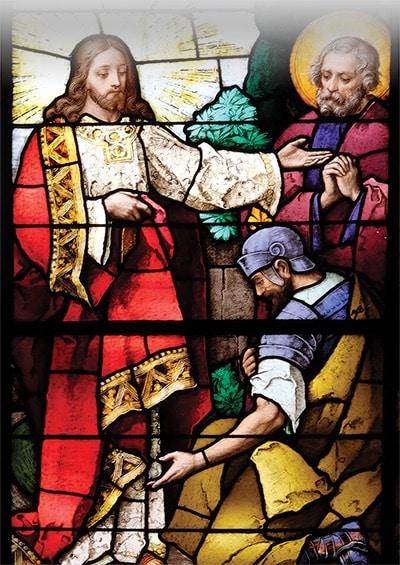 In the year A.D. 28, when Jesus was preaching around Capharnaum, a Roman centurion, whose name we don’t know, sent elders on his behalf to Jesus saying that his slave was sick, near death, and the centurion asked Jesus to save the slave’s life. Jesus headed toward the centurion’s house but when he got closer, “the centurion sent friends to tell him, ‘Lord, do not trouble yourself, for I am not worthy to have you enter under my roof. Therefore, I did not consider myself worthy to come to you, but say the word and let my servant be healed'” (Lk 7:2-8). We of course most humbly say these words of the centurion at every Mass as we prepare our hearts for holy Communion. This was a remarkable incident, a pagan Roman asking a Jewish rabbi to save a life. The insight and faith of the soldier were beyond the understanding of not only the Jewish leaders but even some of those closest to Jesus. Our Savior responded to the message of the centurion by saying, “I tell you, not even in Israel have I found such faith” (LK 7:9). The slave recovered. Another time a Roman centurion came into the presence of Jesus was when our Savior suffered on the cross. “When the centurion who stood facing him saw how He breathed his last he said; “Truly this man was the son of God” (Mk 15:39). This soldier, this gentile, probably in charge of Our Savior’s crucifixion, recognizes Jesus as the Messiah. Jesus’s encounter with the centurion Cornelius according to Acts, Chapter 10, is not face to face but through God’s messenger. Jesus uses this soldier as the catalyst to spread his message and bring the light of Christ to pagans and Jews alike. The angel tells Cornelius that God has found favor with him and that he should invite Peter into his home. The angel doesn’t explain, but Cornelius, with a faith that only comes from the Holy Spirit, invites Peter into his home. What happened with Cornelius will change the world. There would be no restrictions between man and God or between one person and another. Jewish laws, circumcision, dietary restrictions were no longer barriers. Eternal life is for everyone. |
The controversy
In this same time frame, Paul and Barnabas were evangelizing in countries and locations such as Cyprus, Pisidia, Cilicia and Phoenicia — places made up primarily of gentiles but also where some Jews had immigrated. As was the case in Jerusalem, some of these Jews were not eager to hear about Jesus Christ and often threatened the messengers — the apostles. Despite frequent hostility, Paul and Barnabas proclaimed Christ crucified and converted many gentiles. It was soon evident to the two evangelists that any convert or potential convert did not need additional burdens that came with being a Jew, nor did they require such actions on the part of those they converted. There would soon be public differences of opinion about this issue.
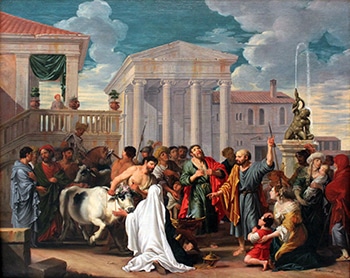
When Paul and Barnabas arrived at Antioch, they were confronted by other Christians: “Some who had come down from Judea were instructing the brothers, ‘Unless you are circumcised according to the Mosaic practice, you cannot be saved'” (Acts 15:1). These Jewish Christians were from Jerusalem, which was at the heart of the Christian movement. The Church teaching authority was in Jerusalem, and the head was the apostle James (the younger). He and many others advocated that any newly converted Christian had to follow all Mosaic law to include circumcision.
Paul and Barnabas objected to what the Christians from Jerusalem were saying and “it was decided that Paul, Barnabas, and some of the others should go up to Jerusalem to the apostles and presbyters about this question” (Acts 15:2). Upon arrival they explained how they were able to convert many gentiles and did so without making the converts comply with Jewish laws: “But some of the party of the Pharisees who had become believers stood up and said, ‘It is necessary to circumcise them and direct them to observe the Mosaic law'” (Acts 15:5)
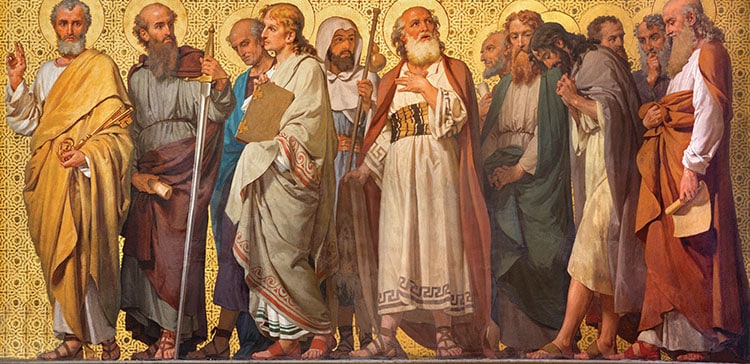
The council
To deal with this controversy, the apostles and others gathered around the year A.D. 50 in what became known as the Council of Jerusalem. Those in attendance debated and discussed the issue regarding the gentiles. Peter related how the converted gentiles had received the Holy Spirit just like the Jewish Christians had: “He [the Holy Spirit] made no distinction between us and them, for by faith he purified their hearts. Why, then, are you now putting God to the test by placing on the shoulders of the disciples a yoke that neither our ancestors nor we have been able to bear? On the contrary, we believe that we are saved through the grace of the Lord Jesus, in the same way as they” (Acts 15: 9-11). Here Peter is speaking of Cornelius upon whom God placed no preconditions in order to become a follower of Christ other than faith. It wasn’t because they, the Jewish Christian, satisfied Jewish law that they received the Holy Spirit, rather it was because of their faith and belief in the risen Lord.
Next before the council, Paul and Barnabas described the miracles and wonders that God had performed during their evangelization of gentiles and non-Jews. James the Lesser, Bishop of Jerusalem, listened to these presentations of how God had graced the Holy Spirit on others, not just the Jewish people. He summarized the debate saying, “It is my judgement, therefore, that we ought to stop troubling the gentiles who turn to God” (Acts 15:19). He said that those gentiles are not to be troubled or burdened with all Jewish laws, except to “avoid pollution from idols, unlawful marriages, the meat of strangled animals, and blood” (Acts 15:20). According to this decision, a gentile seeking to follow Christ, giving up their pagan beliefs, did not have to be circumcised and only had to comply with four of the more than 600 Jewish laws. The council’s decision only applied to gentiles, not to Jewish Christians who traditionally followed all the laws.
| Pope Francis and the Council of Jerusalem |
|---|
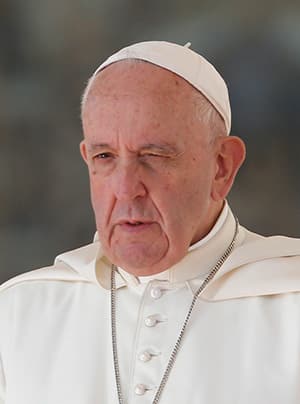 “Dear Brothers and Sisters: In our Catechesis on the Acts of the Apostles, we now consider St. Paul’s first missionary journey. Following fierce persecution, Paul and Barnabas — prompted by the Holy Spirit — set off to spread the Gospel abroad. As a result, the Good News was also preached to the gentiles. This initially caused a lively controversy as to whether a strict adherence to the Mosaic Law was required of these converts. To discern God’s will in these matters, the apostles gathered in Jerusalem, and came to a new shared understanding. The Council of Jerusalem shows us that the way of resolving issues among Christians is an attentive listening to others, yet always under the guidance of the Holy Spirit. Let us pray that God will strengthen in us the desire to embrace the path of dialogue, and to listen patiently to one another, and to the voice of the Lord.” — Pope Francis, general audience, Oct. 23, 2019
|
James decided to issue a letter communicating the council’s decision to the gentiles, specifically to those in Antioch, Syria and Cilicia who were seeking to become followers of Christ. Thus, a Christian had one God, lived in accord with the Ten Commandments and kept the four Jewish laws as pronounced by the council. Not all the Jews, especially the traditionalists, easily accepted the council’s decisions. Even some Jewish converts were skeptical, believing that the best way to test the sincerity of the gentiles was to require circumcision and adherence to Mosaic law. It was the apostles, especially Paul, the great apostle to the gentiles, who shared not only the message of Jesus but promoted and explained the decisions of the council during his many journeys. According to the council, all converts, Jew and gentiles alike, whether or not they complied with Jewish law and tradition, were members of the Church.
While not regarded as an ecumenical council, the council of Jerusalem set the tone and became the model of all future Church councils. The bishops and leaders of the Church are called together, issues debated and a decision process established. Moreover, at the first and all councils thereafter, the divine guidance of the Holy Spirit permeates the proceedings and thus all pronouncements and canons issued are without error.
D. D. Emmons writes from Pennsylvania.

